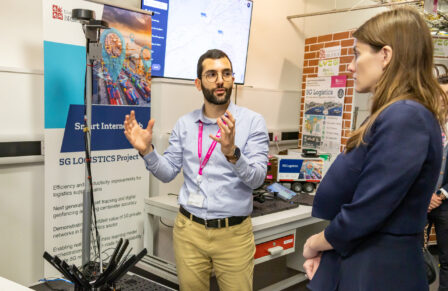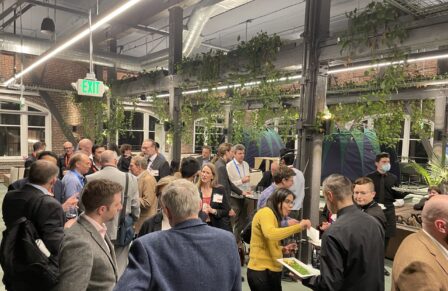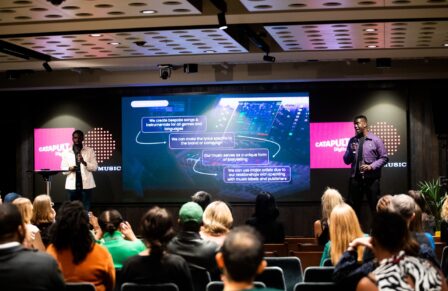Sustainability and technology expert shares her vision for an equitable digital future
Posted 7 Mar 2023
This International Women’s Day Digital Catapult’s trailblazing Board share their insights…
A key part of Digital Catapult’s mission to accelerate digital adoption is working with some of the UK’s trailblazing founders, technology experts, and business leaders. To celebrate International Women’s Day and the crucial role women have played in accelerating the digital future, we sat down with some of our Board to hear more about their vision for an equitable digital future and how we can get there. In this interview we caught up with our newly appointed board member Belinda Howell.
Belinda is founder and Managing Director of sustainability strategy consultancy Decarbonize Limited. She brings extensive experience at board level across sectors from digital and energy infrastructure, natural resources, agri-commodities marine and fisheries through the supply chain to utilities, consumer goods and retail.
As the first CEO of a software as a service (SaaS) technology provider, she has direct experience in digital start-up/scale up and blue-chip drivers for environmental social and governance supply chain information solutions.
Belinda is currently Non-Executive Director on the board of the London Pensions Fund Authority and Marine Management Organisation and Trustee of the National Biodiversity Network. Previous non-executive board experience includes National Centre for Atmospheric Science advising on Net Zero Digital Research Infrastructure, and the Roundtables for Sustainable Palm Oil and Responsible Soy Associations.
Belinda holds a Diploma in Company Directorship with distinction (Institute of Directors) and first class, business award-winning MBA.
What do you feel are the strengths of the UK technology ecosystem? How is it creating a more conducive environment for women to succeed than other ecosystems like Silicon Valley?
The UK tech sector is no. 1 in Europe, with consistent growth seeing it reach the $1 trillion value, retaining its position as the main challenger to the US and China. The UK tech ecosystem leverages our deep science and technology base, leading the way for responsible and values-led innovation, which creates a more conducive environment for women to succeed.
The UK is also becoming a leading hub for impact tech, companies are creating technological solutions to reach the UN Sustainable Development Goals, which tends to align well with creating an environment where women can succeed.
A great strength in the UK is that innovation is spreading out across different areas, rather than remaining concentrated in one area like Silicon Valley. There are now eight cities which are home to two or more high growth unicorn companies, making careers in UK tech more accessible and equitable geographically.
In which area would you like to see more progress? Where do we need to direct our tools/ policy / technology / talent to ensure that women have the support they need to have a successful career in technology?
The UK is facing an ongoing shortage of skilled tech talent. Expanding educational opportunities in tech, especially for those from disadvantaged backgrounds and underrepresented groups like women, is one crucial way to tackle this crisis.
Supporting more diverse talent into tech will not only help to close the skills gap, but it brings fresh perspectives and diversity of thought to the sector, helping to drive greater innovation and creativity. The education sector and the government have a role to play here, but businesses in the tech industry and investors committing more capital to women-led companies can also make a real difference.
The theme of IWD this year is to ‘embrace equity’. At Digital Catapult we’ve been thinking alot about how the metaverse can be an environment where stakeholders of all sizes feel empowered. Could you tell us what an equitable digital future looks like to you?
There are emerging challenges associated with our new digital world; if left unchecked, digital technology can exacerbate existing inequalities and reinforce biases. While some progress has been made in closing the digital divide, 2.9 billion people – mostly in developing countries, and mostly women – remain without access to the Internet. To me, an equitable digital future needs a rights-based, whole-of-society approach to digital transformation that leaves no one behind. We need to make digital work for everyone, everywhere – this generation, and future ones.
How can our male allies support us in building an equitable digital future?
Our male allies can support us by offering and providing sponsorship and mentorship to female colleagues, this can have a huge impact on career development. In a WeAreTechWomen survey, 75% of women said at least some men within their organisation are not allies. Talking over or not listening to women is the main reason given, so male allies calling out this behaviour as and when it occurs can help to build an equitable digital future. It’s also important that our male allies make sure they are giving proper credit and recognising the achievements of women in their workplace.
What resources or advice has been helpful for you throughout your career that you would like to share with other women?
Having access to a senior mentor (mine have all been male, since I have worked in male dominated sectors) has always been important to me. The best advice I received on my first Executive Director role was, get the strategy right and the money to resource it will follow.
What one piece of advice would you give to someone interested in working in the technology industry?
Embrace your inner geek! Collaboration is key in science and tech – so get into those hackathons. If you do what you do well, innovate and succeed, you will be recognised. If it doesn’t work out, bring the learning from that experience to your next project or role.
At Digital Catapult we are committed to building an organisation that is fully representative and reflective of UK society. You can find out more about our equality, diversity and inclusion charter here.









